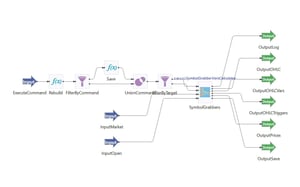The rise of electronic trading has made interacting with the world’s financial markets a game of speed, where mere seconds can determine whether a trade is worth it. Yet this faster approach to trading has meant that financial managers can no longer rely on outdated technology to plan and execute their strategies… (And, yes, that includes Microsoft Excel.)
Of course, there are many companies and types of software out there that promise to help you ride the tide of electronic trading. But what should you go for if you’re a small-to-medium enterprise?
- The off-the-shelf software that can’t be customised to your needs? or
- The customisable software that costs a big chunk of your company’s annual budget, takes months to code, and requires you to have in-house experts to maintain it?
We’re here to tell you that there is a third and better option that uses Event Stream Processing to create software that is
- Fully customisable;
- More affordable; and
- Which reduces financial software development time by at least 50%!
Over this and the subsequent three blogs, we’ll explain how this is possible. But let’s start from the beginning.
What is Event Stream Processing?
Event Stream Processing, which is often shortened to ESP, is literally the sum of its parts.
- An event can stand for a market price, a trade, a piece of news, and so on. In other words, any happening that is recorded, which in turn, becomes data.
- The Stream is about the flow, and just like a real-life narrow river, a virtual stream is ever-flowing. In this case, the stream carries data from wherever you need it to, so in financial terms, this could be from the markets, exchanges, macro data, and so on.
- Processing is the act of checking and analysing that data. Nevertheless, this process can be modified to fit your needs and financial strategy. In other words, the computer can be taught which data to check, ignore, compartmentalise, and act on in the same way you would.
What Is Event Stream Processing Used for?
What such software does is give you two fantastic ways to use data to your advantage.
The first is the ability to process data in whatever way you need. This includes:
- Using data to perform calculations, such as averages, sums, and so on;
- Transforming it by changing its format;
- Analysing it by looking at what it’s telling us about past events or future likelihoods; and
- Enriching it by adding metadata that can make it more easily searchable in our databases.
This is indeed powerful on its own, but the best part is that it has the ability to create a pipeline of actions, too.
What this second part means, is that the same data can go through several transformations to create the statistics and actions you require. Similarly to how Google Analytics works if you’ve ever used it!
The best part is that this doesn’t have to be complicated or expensive to create and run thanks to our partnership with TIBCO™, through which we have created an SME-specific system that makes it all a breeze.
The Wakett & TIBCO™ Streaming Wonder Team
We love working with open-source software, and we believe it intrinsically creates value for anyone who uses it. That is certainly true for the open-source event streaming platform, Apache Kafka, which gives developers the tools to create programs from scratch that can do what we mentioned above completely free.
But there is just one issue with it in this case: most companies don’t have experts who know how to use it, so they need to employ developers to create it specifically for them. This, as you can imagine, does not come cheap and usually takes many long months to develop.
But here is where our partners, TIBCO™, come in. See, TIBCO™ have revolutionised the world of financial software development through their TIBCO™ StreamBase EventFlow™, which has turned Apache Kafka’s complex code into a simple flowchart of actions.

These ‘actions’ are just as powerful and customisable as the code to the left, but what makes them unique and extremely useful is that can be moved around.
In other words, TIBCO™have given each of those ‘actions’ a job, and once the developer understands how to connect them, they can then be placed in set ways to create Event Stream Processes based on your financial strategy.
Through TIBCO™’s fantastic approach, the software developer can focus on creating your program without writing long coding lines in C++, C#, Java, Python, or Matlab,
which has obviously cut down the time spent on financial software development…
…but we at Wakett have taken it a step further.
Using this software, we have created multiple, financially-aimed Wakett frameworks for
This means that on top of reducing the time needed to code, we have also shortened the time required to set up a workflow that is based on your specific investment management processes and investment strategy.
Plus, this helps take your strategy to market quicker, allowing you to make better and more accurate trades in a shorter span of time!
So, yes, that is how you can save at least 50% of the time you’d normally spend waiting for financial software development to be completed...
...but this isn’t the end of our journey.
Join us for next week’s blog, where we’ll discuss how TIBCO™’s Streaming Adapters, which are usually only available to world-leading financial institutions, can be part of your system, even if your budget isn’t as huge as that of banks or exchanges.
